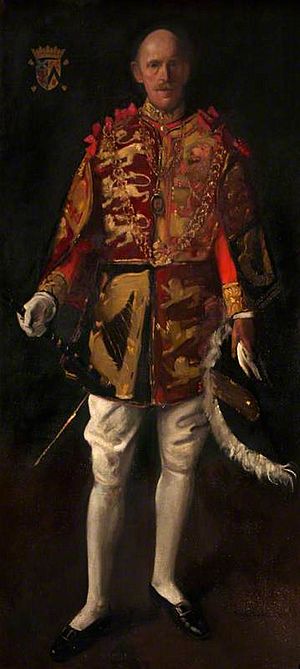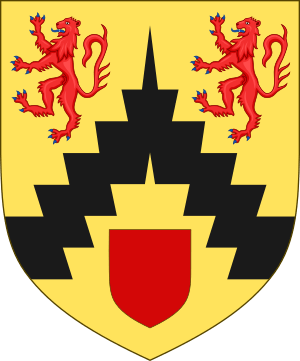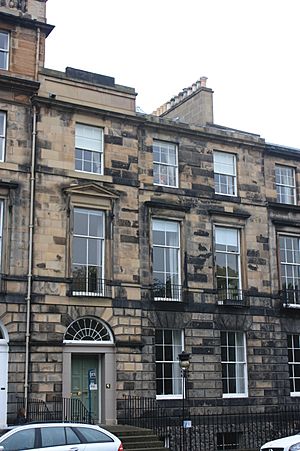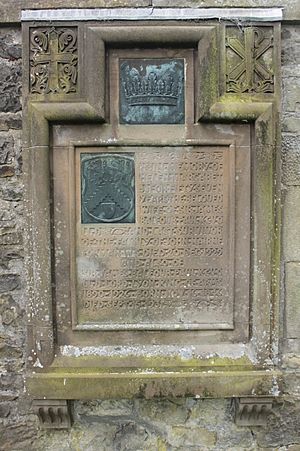James Balfour Paul facts for kids
Quick facts for kids
Sir James Balfour Paul
|
|
|---|---|

Sir James Balfour Paul
|
|
| Lord Lyon King of Arms | |
| In office 1890–1927 |
|
| Preceded by | George Burnett |
| Succeeded by | George Swinton |
| Personal details | |
| Born | 16 November 1846 Edinburgh |
| Died | 15 September 1931 (aged 84) Edinburgh |
| Resting place | Dean Cemetery |
| Nationality | Scottish |
Sir James Balfour Paul (born November 16, 1846 – died September 15, 1931) was a very important person in Scotland. He was the Lord Lyon King of Arms from 1890 to 1926. This special job meant he was in charge of all things related to heraldry in Scotland. Heraldry is the study of coats of arms and family symbols.
Contents
Sir James's Early Life and Education
Sir James Balfour Paul was born in Edinburgh, Scotland. His father was Reverend John Paul, a minister, and his mother was Margaret Balfour. He grew up in a house at 13 George Square, Edinburgh.
He went to the Royal High School and then studied at the University of Edinburgh. These schools helped him prepare for his future career.
Becoming Lord Lyon King of Arms
After finishing university, Sir James became an advocate in 1870. An advocate is a type of lawyer in Scotland who represents people in court. He also worked as a Registrar for Friendly Societies from 1879 to 1890. Friendly Societies were groups that helped people with things like insurance.
In 1890, Sir James was given the important role of Lord Lyon King of Arms. This was a big honor. The Lord Lyon is the official who manages all coats of arms and family symbols in Scotland. They make sure these symbols are used correctly.
He was made a Knight Bachelor in 1900. This means he was given the title "Sir" for his services. Later, in 1926, he received another high honor, becoming a Knight Commander of the Royal Victorian Order.
Important Work and Cases
Sir James Balfour Paul was known for his many writings. One of his most famous works was The Scots Peerage. This was a huge nine-volume book series published between 1904 and 1914. It contained detailed information about noble families in Scotland.
As Lord Lyon, he also handled interesting cases about coats of arms. For example, in 1909, he decided a case about who had the right to use the coat of arms for Clan Macrae. He also ruled on a case about a woman's right to use her father's family symbols. His decisions in these cases were very important for Scottish heraldry.
Sir James was also a member of several important groups. He was a Fellow of the Society of Antiquaries of Scotland, which studies history and old things. He also gave lectures on heraldry, sharing his knowledge with others.
Family and Later Years
Sir James lived at 30 Heriot Row in Edinburgh. He married Helen Margaret in 1872, and they had four children: three sons and one daughter. Two of his sons also became notable. John William became a heraldic officer, just like his father. Arthur Forman became a well-known architect.
Sir James Balfour Paul retired from his role as Lord Lyon at the end of 1926. He passed away on September 15, 1931, in Edinburgh. He is buried with his family in Dean Cemetery in Edinburgh.
Sir James's Published Works
Sir James Balfour Paul wrote and edited many books and records during his life. These works are still important for people studying Scottish history and heraldry today.
- History of the Royal Company of Archer (1875)
- (editor) Record Series of Registrum Magni Sigilli (1882–1883)
- Handbook to the Parliament House (1884)
- Heraldry in relation to Scottish History and Art (1890)
- An Ordinary of Arms Contained in the Public Register of All Arms and Bearings in Scotland (1893) 1st ed., (1903) 2nd ed.
- Memoir and Remains of John M. Gray in 2 vols. (1895)
- (editor) The Scots Peerage Vol. I (1904), with successive volumes up to Vol. IX (1914)
- (editor) Accounts of the Lord High Treasurer of Scotland Vols. II–XI, 1900–1916 (a series of volumes about historical financial records)
- "Ancient Artillery, with some notes on Mons Meg" in The Proceedings of the Society of Antiquaries of Scotland, volume 50, 1915–1916, pps: 191–201
- (editor) Scottish History Society, Diary of George Ridpath, Minister of Stitchell, 1755–1761 (1922)
Sir James's Coat of Arms
 |
|
A coat of arms is a unique design that represents a person, family, or organization. Sir James Balfour Paul had his own coat of arms, which included symbols related to his role as Lord Lyon King of Arms and his family. His motto, Pro rege et republica, means "For King and Commonwealth" in Latin. This shows his dedication to his country and its people.
 | Anna J. Cooper |
 | Mary McLeod Bethune |
 | Lillie Mae Bradford |




